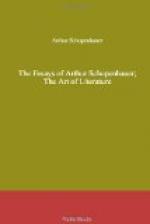[Footnote 1: Translator’s Note.—Tomas de Yriarte (1750-91), a Spanish poet, and keeper of archives in the War Office at Madrid. His two best known works are a didactic poem, entitled La Musica, and the Fables here quoted, which satirize the peculiar foibles of literary men. They have been translated into many languages; into English by Rockliffe (3rd edition, 1866). The fable in question describes how, at a picnic of the animals, a discussion arose as to which of them carried off the palm for superiority of talent. The praises of the ant, the dog, the bee, and the parrot were sung in turn; but at last the ostrich stood up and declared for the dromedary. Whereupon the dromedary stood up and declared for the ostrich. No one could discover the reason for this mutual compliment. Was it because both were such uncouth beasts, or had such long necks, or were neither of them particularly clever or beautiful? or was it because each had a hump? No! said the fox, you are all wrong. Don’t you see they are both foreigners? Cannot the same be said of many men of learning?]
In learning a language, the chief difficulty consists in making acquaintance with every idea which it expresses, even though it should use words for which there is no exact equivalent in the mother tongue; and this often happens. In learning a new language a man has, as it were, to mark out in his mind the boundaries of quite new spheres of ideas, with the result that spheres of ideas arise where none were before. Thus he not only learns words, he gains ideas too.
This is nowhere so much the case as in learning ancient languages, for the differences they present in their mode of expression as compared with modern languages is greater than can be found amongst modern languages as compared with one another. This is shown by the fact that in translating into Latin, recourse must be had to quite other turns of phrase than are used in the original. The thought that is to be translated has to be melted down and recast; in other words, it must be analyzed and then recomposed. It is just this process which makes the study of the ancient languages contribute so much to the education of the mind.
It follows from this that a man’s thought varies according to the language in which he speaks. His ideas undergo a fresh modification, a different shading, as it were, in the study of every new language. Hence an acquaintance with many languages is not only of much indirect advantage, but it is also a direct means of mental culture, in that it corrects and matures ideas by giving prominence to their many-sided nature and their different varieties of meaning, as also that it increases dexterity of thought; for in the process of learning many languages, ideas become more and more independent of words. The ancient languages effect this to a greater degree than the modern, in virtue of the difference to which I have alluded.




